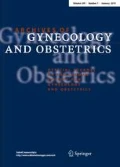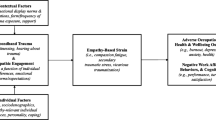Abstract
Purpose
The aim of the study is to investigate the infertility-related stress in a Hungarian infertile population and examine the effects of gender roles, child wish motives, subjective well-being, and marital relationship on the experience of infertility according to our self-constructed conceptual framework.
Methods
Validated self-report questionnaires measuring the factors of the conceptual framework were taken in the study carried out in a sample of 53 people attending the fertility unit of a Hungarian clinic.
Results
Infertility-related global stress, infertility-related social concerns, and general health problems have more intensive effect on women than on men (all p < 0.05). Women from the infertile group scored higher their femininity (p < 0.001) and lower their general health (p < 0.05) than the reference population. Infertile men believe deeper in meaning of life than women (p < 0.05) or reference population (p < 0.01). Femininity (β = 0.460, p < 0.05), traditional gender role concepts (β = −0.248, p < 0.05), general health (β = −0.474, p < 0.05), and marital relationship (β = −0.251, p < 0.05) play the strongest role to predict stress caused by infertility.
Conclusions
The current study emphasizes the importance of interrelations of gender role attitudes, gender role identification, general health, and satisfaction in couple relationship with infertility-related stress. In further investigations, both social and personal aspects and their effect on experiencing infertility need to be measured in infertile people, particularly in different cultural settings.

Similar content being viewed by others
References
Greil AL, Slauson-Blevins K, McQuillan J (2010) The experience of infertility: a review of recent literature. Sociol Health Illn 32(1):140–162
Chachamovich JR, Chachamovich E, Ezer H, Fleck MP, Knauth DR, Passos EP (2010) Investigating quality of life and health-related quality of life in infertility: a systematic review. J Psychosom Obstet Gynecol 31(2):101–110
Oddens BJ, den Tonkelaar I, Nieuwenhuyse H (1999) Psychosocial experiences in women facing fertility problems—a comparative survey. Hum Reprod 14(1):255–261
Salvatore P, Gariboldi S, Offidani A, Coppola F, Amore M, Maggini C (2001) Psychopathology, personality, and marital relationship in patients undergoing in vitro fertilization procedures. Fertil Steril 75(6):1119–1125
Wischmann T, Stammer H, Scherg H, Gerhard I, Verres R (2001) Psychosocial characteristics of infertile couples: a study by the ‘Heidelberg Fertility Consultation Service’. Hum Reprod 16(8):1753–1761
Fassino S, Piero A, Boggio S, Piccioni V, Garzaro L (2002) Anxiety, depression and anger suppression in infertile couples: a controlled study. Hum Reprod 17(11):2986–2994
Verhaak CM, Smeenk JMJ, van Minnen A, Kremer JAM, Kraaimaat FW (2005) A longitudinal, prospective study on emotional adjustment before, during and after consecutive fertility treatment cycles. Hum Reprod 20(8):2253–2260
Holter H, Anderheim L, Bergh C, Möller A (2006) First IVF treatment—short-term impact on psychological well-being and the marital relationship. Hum Reprod 21(12):3295–3302
Jordan C, Revenson TA (1999) Gender differences in coping with infertility: a meta-analysis. J Behav Med 22(4):341–358
Chachamovich JLR, Chachamovich E, Cordova FP, Fleck MMP, Knauth D, Passos EP (2009) Congruence of quality of life among infertile men and women: findings from a couple-based study. Hum Reprod 24(9):2151–2157
Chachamovich JLR, Chachamovich E, Ezer H, Cordova FP, Fleck MMP, Knauth D, Passos EP (2010) Psychological distress as predictor of quality of life in men experiencing infertility: a cross-sectional survey. Reprod Health 7(3). http://www.reproductive-health-journal.com. Accessed 2 September 2010
Peterson BD, Pirritano M, Christensen U, Schmidt L (2008) The impact of partner coping in couples experiencing infertility. Hum Reprod 23(5):1128–1137
Thompson EH, Woodward JT, Stanton Al (2012) Dyadic goal appraisal during treatment for infertility: how do different perspectives relate to partners’ adjustment? Int J Behav Med 19(3):252–259
Pottinger AM, McKenzie C, Fredericks J, DaCosta V, Wynter S, Everett D, Walters Y (2006) Gender differences in coping with infertility among couples undergoing counselling for in vitro fertilization treatment. West Indian Med J 55(4):237–242
Chachamovich JR, Chachamovich E, Ezer H, Fleck MP, Knauth D, Passos EP (2010) Agreement on perceptions of quality of life in couples dealing with infertility. J Obstet Gynecol Neonat Nurs 39(5):557–565
Berg BJ, Wilson JF, Weingartner PJ (1991) Psychological sequelae of infertility treatment: the role of gender and sex-role identification. Soc Sci Med 33(9):1071–1080
Pasch LA, Dunkel-Schetter C, Christensen A (2002) Differences between husbands’ and wives’ approach to infertility affect marital communication and adjustment. Fertil Steril 77(6):1241–1247
Slepičková L (2010) Couples undergoing infertility treatment in the Czech Republic: broad range of possibilities in a traditional milieu. Soc Theor Health 8:151–174
Friedman RS, Weissbrod CS (2005) Work and family commitment and decision-making status among emerging adults. Sex Roles 53:317–325
Yaremko SK, Lawson KL (2007) Gender, internalization of expressive traits, and expectations of parenting. Sex Roles 57(9–10):675–687
Verbrugge LM (1986) Role burdens and physical health of women and men. Women Health 11:47–77
Matz DM, Handley KB, Eisler RM (1995) The relationship between feminine gender role stress, body image, and eating disorders. Psychol Women Q 19:493–508
Sánchez-López MP, Cuellar-Flores I, Dresch V (2012) The impact of gender roles on health. Women Health 52(2):182–196
Gnoth C, Godehardt E, Frank-Hermann P, Friol K, Tigges J, Freundl G (2005) Definition and prevalence of subfertility and infertility. Hum Reprod 20(5):1144–1147
Kaáli SG (ed) (2006) A meddőség korszerű diagnosztikája és kezelése [The modern diagnosis and therapy of infertility]. Budapest, Medicina Könyvkiadó Rt
Hambleton RK (1994) Guidelines for adapting educational and psychological tests: a progress report. Eur J Psychol Assess 10:229–244
Bagdy E, Pressing L, Bugán A, Zétényi T (1986) Az MMPI-próba. Elmélet és alkalmazás. [The MMPI. Theory and practice] Budapest, Akadémiai Kiadó
Gervai J, Turner PJ, Hinde RA (1995) Gender-related behaviour, attitudes, and personality of young children in England and Hungary. Int J Behav Dev 18(1):105–126
Brähler E, Stöbel-Richter Y, Schumacher J (2001) Für und Wider eines eigenen Kindes: Der Leipziger Fragebogen zu Kinderwunschmotiven (LKM). Diagn 47(2):96–106
Beck AT, Steer RA, Garbin MG (1988) Psychometric properties of the Beck Depression Inventory: twenty-five years of evaluation. Clin Psychol Rev 8(1):77–100
Rózsa S, Szádóczky E, Füredi J (2001) A Beck Depresszió Kérdőív rövidített változatának jellemzői hazai mintán. [Psychometric properties of the Hungarian version of the shortened Beck Depression Inventory]. Psychiatr Hung 16(4):384–402
Skrabski A, Kopp M, Rózsa S, Réthelyi J, Rahe RH (2005) Life meaning: an important correlate of health in the Hungarian population. Int J Behav Med 12(2):78–85
Goldberg D, Williams P (1988) A user’s guide to the General Health Questionnaire. NFER-Nelson, Windsor
Balajti I, Vokó Z, Ádány R, Kósa K (2007) A koherencia-érzés mérésére szolgáló rövidített kérdőív és a lelki egészség (GHQ-12) kérdőív magyar nyelvű változatainak validálása. [Validation of the Hungarian versions of the abbreviated sense of coherence (SOC) scale and the general health questionnaire (GHQ-12)] Mentálhig Pszichoszom 8(2):147–161
Spanier GB (1976) Measuring dyadic adjustment: new scales for assessing the quality of the marriage and similar dyads. J Marriage Fam 38(1):15–28
Newton CR, Sherrard W, Glavac I (1999) The fertility problem inventory: measuring perceived infertility-related stress. Fertil Steril 72(1):54–62
Kapitány B, Spéder Z (2012) Gyermekvállalás. [Fertility] In: Őri P, Spéder Z (eds) Demográfiai Portré 2011. Jelentés a magyar népesség helyzetéről [Demographic Portrait of Hungary 2011. Report on Demographic Conditions of the Hungarian Population]. Budapest, KSH Népességtudományi Kutatóintézet
Bayley TM, Slade P, Lashen H (2009) Relationships between attachment, appraisal, coping and adjustment in men and women experiencing infertility concerns. Hum Reprod 24(11):2827–2837
Peterson BD, Newton CR, Feingold T (2007) Anxiety and sexual stress in men and women undergoing infertility treatment. Fertil Steril 88(4):911–914
McDonough P, Amick BC (2001) The social context of health selection: a longitudinal study of health and employment. Soc Sci Med 53(1):135–145
Schanz S, Baeckert-Sifeddine IT, Braeunlich C, Collins SE, Batra A, Gebert S, Hautzinger M, Flierlbeck G (2005) A new quality-of-life measure for men experiencing involuntary childlessness. Hum Reprod 20(10):2858–2865
Adler JD, Boxley RL (1985) The psychological reactions to infertility: sex roles and coping styles. Sex Roles 12(3):271–279
Cook R (1993) The relationship between sex-role and emotional functioning in patients undergoing assisted conception. J Psychosom Obstet Gynecol 14(1):31–40
Sachs-Ericsson N, Ciarlo JA (2000) Gender, social roles and mental health. Sex Roles 43:605–628
Kopp M, Skrabski Á (2003) A gyermekvállalás pszichológiai és szociális háttértényezői a magyar népesség körében. [Some psychological and social background factors of childbearing in the Hungarian population] Demogr 46:383–395
Herrmann D, Scherg H, Verres R, von Hagens C, Strowitzki T, Wischmann T (2011) Resilience in infertile couples acts as a protective factor against infertility-specific distress and impaired quality of life. J Assist Reprod Genet 28(11):1111–1117
Callan VJ (1987) The personal and marital adjustment of mothers and of voluntarily and involuntarily childless wives. J Marriage Fam 49(4):847–856
Conflict of interest
We declare that we have no conflict of interest.
Author information
Authors and Affiliations
Corresponding author
Rights and permissions
About this article
Cite this article
Cserepes, R.E., Kollár, J., Sápy, T. et al. Effects of gender roles, child wish motives, subjective well-being, and marital adjustment on infertility-related stress: a preliminary study with a Hungarian sample of involuntary childless men and women. Arch Gynecol Obstet 288, 925–932 (2013). https://doi.org/10.1007/s00404-013-2835-7
Received:
Accepted:
Published:
Issue Date:
DOI: https://doi.org/10.1007/s00404-013-2835-7




